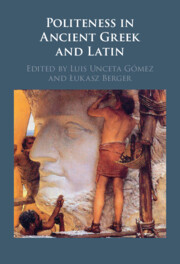Book contents
- Politeness in Ancient Greek and Latin
- Politeness in Ancient Greek and Latin
- Copyright page
- Contents
- Figures and Tables
- Contributors
- Preface
- Abbreviations
- Part I Introduction
- Part II The Expression of Im/Politeness
- Part III Im/Politeness in Use
- Chapter 6 Friendship Terms in Plato
- Chapter 7 Conversational Openings and Politeness in Menander
- Chapter 8 Im/Politeness of Interruptions in Roman Comedy
- Chapter 9 Im/Politeness and Conversation Analysis in Greek Tragedy
- Chapter 10 Qui Honoris Causa Nominatur
- Chapter 11 Banter, Teasing and Politeness in Varro’s De Re Rustica
- Part IV Ancient Perceptions on Im/Politeness
- Glossary
- References
- Index Rerum
- Index Locorum
Chapter 7 - Conversational Openings and Politeness in Menander
An Integrated Pragmatic Approach to Menandrean Dialogue*
from Part III - Im/Politeness in Use
Published online by Cambridge University Press: 08 September 2022
- Politeness in Ancient Greek and Latin
- Politeness in Ancient Greek and Latin
- Copyright page
- Contents
- Figures and Tables
- Contributors
- Preface
- Abbreviations
- Part I Introduction
- Part II The Expression of Im/Politeness
- Part III Im/Politeness in Use
- Chapter 6 Friendship Terms in Plato
- Chapter 7 Conversational Openings and Politeness in Menander
- Chapter 8 Im/Politeness of Interruptions in Roman Comedy
- Chapter 9 Im/Politeness and Conversation Analysis in Greek Tragedy
- Chapter 10 Qui Honoris Causa Nominatur
- Chapter 11 Banter, Teasing and Politeness in Varro’s De Re Rustica
- Part IV Ancient Perceptions on Im/Politeness
- Glossary
- References
- Index Rerum
- Index Locorum
Summary
The opening sequence is a delicate phase of any conversation. Through ritualized acts, interlocutors come into contact, reveal their respective stances toward each other and prepare themselves to broach the first topic of the discussion. Their positioning in the opening sequence influences the subsequent phases of the interaction. An integrated pragmatic approach that combines Conversation Analysis, Speech Act Theory and Im/Politeness Research is well-suited to studying this communicative stage in its complexity.
This chapter examines the opening phase in the dialogues of Menander’s comedy from such a perspective. After showing that, in Menander’s Athens, conversational openings follow rules analogous to those in our society, it then demonstrates how Menander exploits the social delicateness of the phase. Clear patterns in the development of Menandrean conversational openings are identified, which are linked to the communicative situation as well as to the speakers’ state of mind and relationship. Finally, the chapter discusses how in Dyskolos the poet plays with im/politeness in conversational openings to characterize the protagonist, structure the plot and generate humour.
Keywords
- Type
- Chapter
- Information
- Politeness in Ancient Greek and Latin , pp. 175 - 201Publisher: Cambridge University PressPrint publication year: 2022

